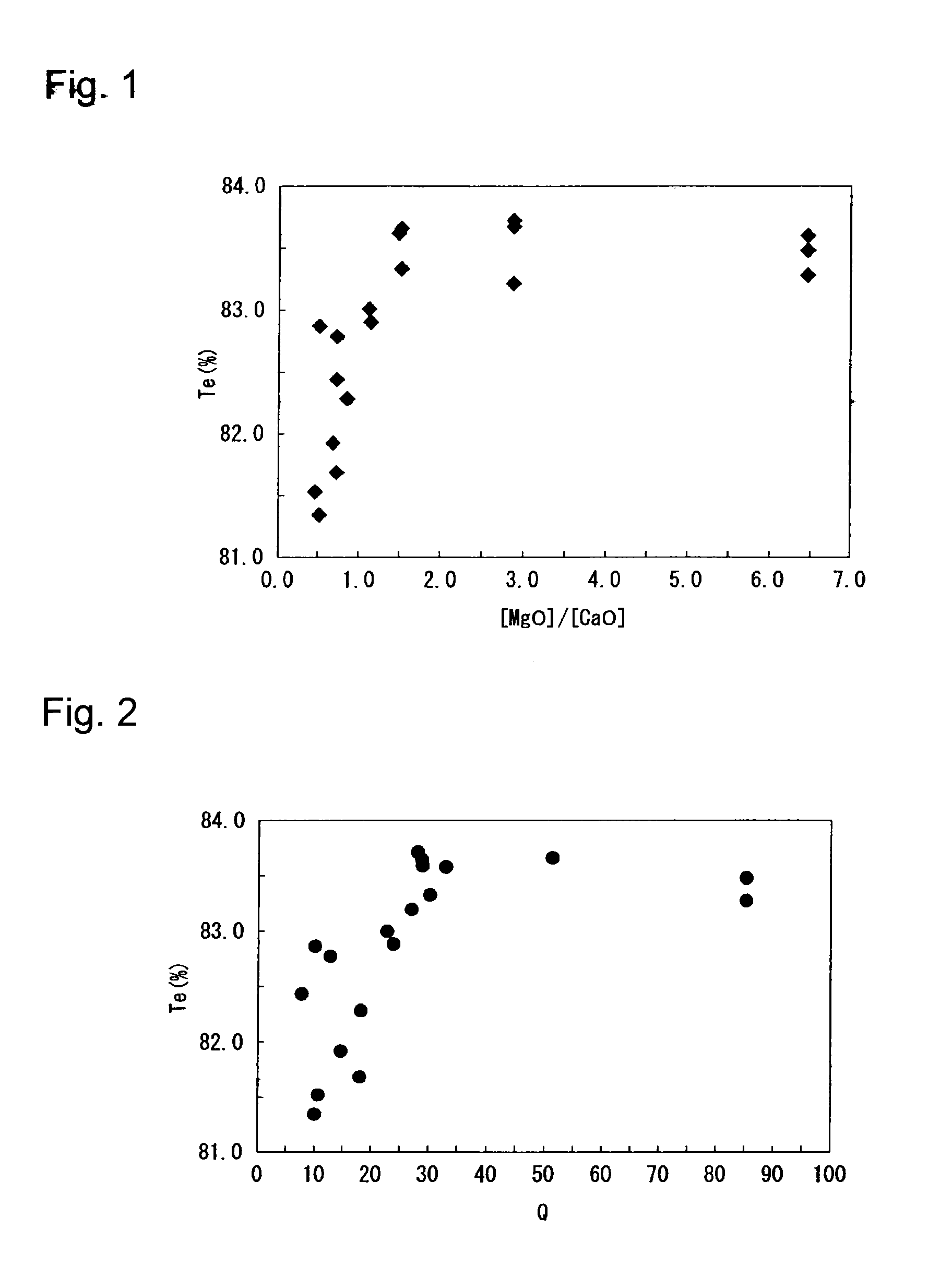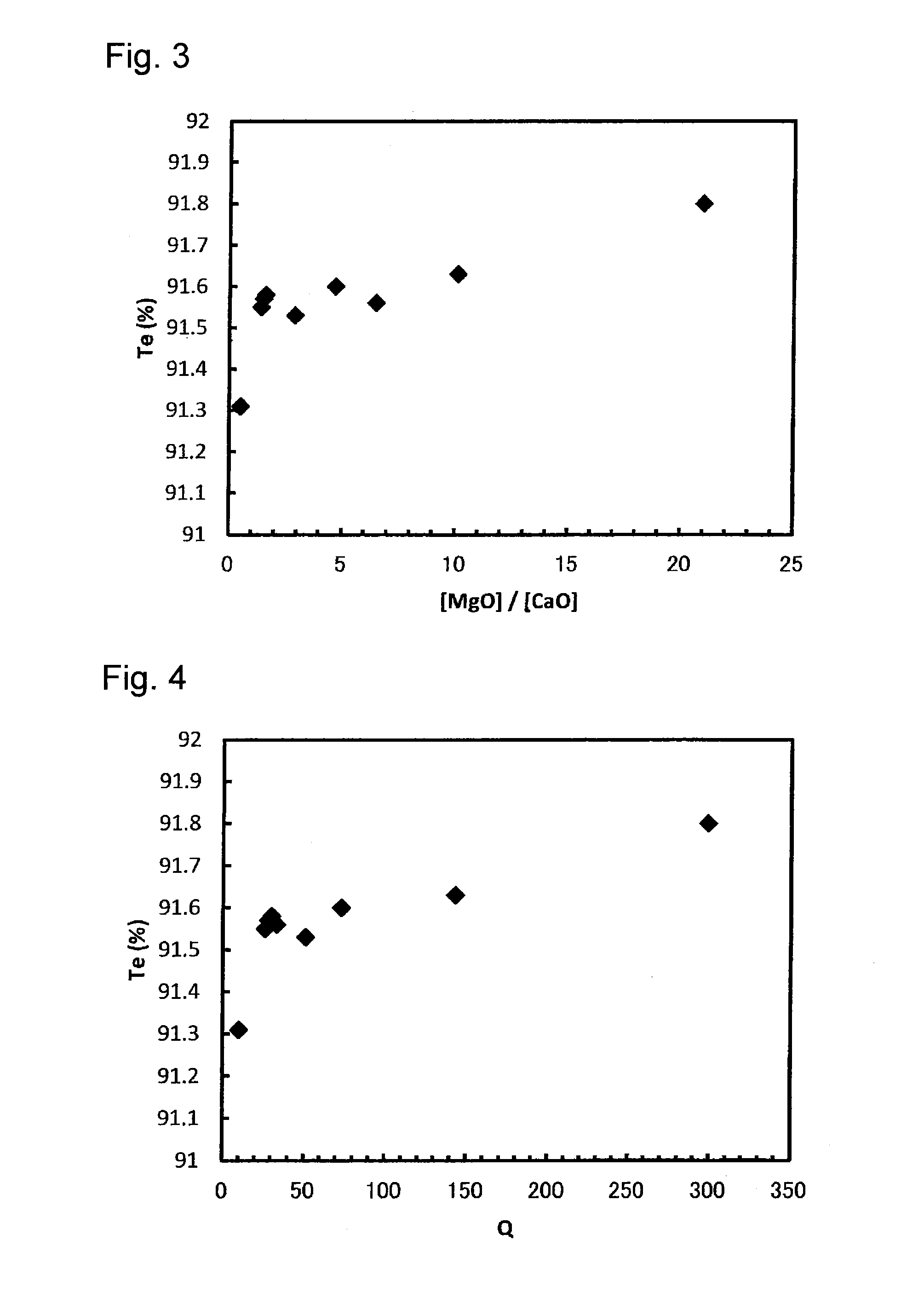Glass plate and process for its production
a technology of glass plate and glass raw material, applied in the field of glass plate, can solve the problems of high transmission glass plate, high iron content of glass raw material, etc., and achieve the effect of reducing iron content, reducing production costs, and reducing production costs
- Summary
- Abstract
- Description
- Claims
- Application Information
AI Technical Summary
Benefits of technology
Problems solved by technology
Method used
Image
Examples
examples
[0181]Now, the present invention will be described in detail with reference to Examples, but. it should be understood that the present invention is by no means limited to such specific Examples. Here, the values of Redox, Tv and Te were obtained by the following methods.
(Redox)
[0182]The amount of total iron calculated as Fe2O3 and the amount of divalent iron in the glass were obtained as described below, and Redox was obtained as a mass percentage of divalent iron / total iron, i.e. (Fe2+ / (Fe2++Fe3+)).
[0183]The amount of Fe2O3 in the glass is the content (%=mass percentage) of total iron calculated as Fe2O3 obtained by a fluorescent X-ray measurement.
[0184]The amount of divalent iron in the glass required for the calculation of Redox is a value quantified by a wet-system analytical method. Specifically, the obtained glass is pulverized, and the glass powder is dissolved in HF and mixed with bipyridyl and an ammonium acetate solution to let it form a color, the absorption peak intensit...
examples 1 to 19
[0189]Glass raw material was prepared by mixing various starting materials for glass matrix composition such as silica sand, etc. and a fining agent (SO3) to obtain a composition as shown in Table 1. The glass raw material was put into a crucible and heated in an electric furnace at 1,500° C. for 3 hours to obtain molten glass. The molten glass was cast on a carbon plate and cooled. Both sides were polished to obtain a glass plate having a thickness of 4 mm. With respect to this glass plate, the transmittance was measured every 1 nm by means of a spectrophotometer (Lambda 950, manufactured by Perkin Elmer), and Tv and Te were obtained. The results are shown in Tables 1 and 2 and FIGS. 1 and 2.
TABLE 1Compo- sition[%]Ex. 1Ex. 2Ex. 3Ex. 4Ex. 5SiO272.671.566.567.561.8Al2O30.00.05.25.310.2Na2O11.014.116.910.716.5CaO2.23.71.54.33.0MgO14.210.79.912.38.6Fe2O30.10.10.10.10.1Redox 3226273133[%][MgO] / 6.52.96.52.92.9[CaO]Value Q8551852827Value TI3013132931Tv [%]89.889.889.689.889.6Te [%]83.583...
examples 20 to 28
[0193]For a glass plate having a composition wherein the content of Fe2O3 was smaller than in Table 1, glass raw material was prepared by mixing various starting materials for glass matrix composition such as silica sand, etc. and a fining agent (SO3) to obtain a composition as shown in Table 3. The glass raw material was put into a crucible and heated in an electric furnace at 1,500° C. for 3 hours to obtain molten glass. The molten glass was cast on a carbon plate and cooled. Both sides were polished to obtain a high transmission glass plate having a thickness of 4 mm. With respect to the high transmission glass plate, the transmittance was measured every 1 nm by means of a spectrophotometer (Lambda 950, manufactured by Perkin Elmer), and Tv and Te were obtained. The results are shown in Table 3 and FIGS. 3 and 4.
TABLE 3Composition [%]Ex. 20Ex. 21Ex. 22Ex. 23Ex. 24Ex. 25Ex. 26EX. 27EX. 28SiO272.671.869.971.562.772.273.172.572.9Al2O31.801.731.800.0610.30.901.701.01.1Na2O15.014.815....
PUM
| Property | Measurement | Unit |
|---|---|---|
| solar transmittance | aaaaa | aaaaa |
| thickness | aaaaa | aaaaa |
| wavelength | aaaaa | aaaaa |
Abstract
Description
Claims
Application Information
 Login to View More
Login to View More - R&D
- Intellectual Property
- Life Sciences
- Materials
- Tech Scout
- Unparalleled Data Quality
- Higher Quality Content
- 60% Fewer Hallucinations
Browse by: Latest US Patents, China's latest patents, Technical Efficacy Thesaurus, Application Domain, Technology Topic, Popular Technical Reports.
© 2025 PatSnap. All rights reserved.Legal|Privacy policy|Modern Slavery Act Transparency Statement|Sitemap|About US| Contact US: help@patsnap.com


